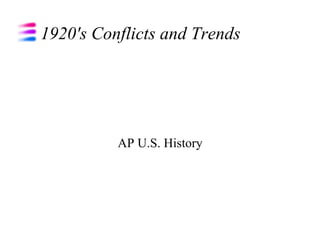Conflict In The 1920s
- 1. 1920's Conflicts and Trends AP U.S. History
- 2. Marcus Garvey and the UNIA Native of Jamaica-Universal Negro Improvement Association Black racial pride and separatism Return to Africa Alienated older rights groups Sold stock in the Black Star Steamship Line Take migrants to Africa Bankrupt-imprisoned for fraud and deported
- 3. Mexicans and Puerto Ricans Settled in Southwestern cities Low paying jobs, poor neighborhoods Barrios First major migration of Puerto Ricans to U.S. mainland New York City Service industries and manufacturing
- 4. Conflict of values Rapid changes (automobile, revolution in morals, jazz music, immigration, “Great Migration”) brought strong reactions from white Protestant Americans-saw traditions as threatened. Rural-urban conflict Knights of the Ku Klux Klan Intimidate blacks, immigrants, Catholics, Jews, bootleggers, etc. “ 100 percent Americanism”
- 5. Prohibition 18 th Amendment Implemented by Volstead Act-created more problems! Enforcement was difficult-urban areas Speakeasies, bathtub gin, organized crime Eventually, many people who initially supported prohibition change their views because of the corruption!
- 6. Creationism and the Scopes Trial Fundamentalist Protestants-led by William Jennings Bryan-prohibit teaching of evolution in schools. 1925-Tennessee legislature passed law which forbade any teacher in state's schools or colleges to teach evolution. American Civil Liberties Union-John Thomas Scopes-test law-defended by Clarence Darrow Both sides claimed a moral victory.
- 7. Sacco and Vanzetti Nicola Sacco and Bartolomeo Vanzetti were accused of robbing and murdering two men. Italian immigrants and admitted anarchists Convicted and sentenced to death Much protest about lack of a fair trial Executed in 1927
- 8. Warren Harding Administration Corrupt “friends” and officials-violated prohibition Teapot Dome Scandal Sec. of the Interior, Albert Fall, secured the transfer of several naval oil reserves to his jurisdiction. Secretly leased reserves to Monmouth Oil and Pan-American Petroleum Convicted for bribery and defrauding the government Attorney General Daugherty took bribes from bootleggers, tax evaders, etc. for protection.
- 9. Calvin Coolidge Administration Harding dies in office-able to avoid scandals “ The business of the United States is business.” No real presidential leadership McNary-Haugen Bill Rise crop prices-vetoed twice by Coolidge
- 10. Hoover's Administration Dawes Plan-war debts and reparations Kellog-Briand Pact-no enforcement Black Thursday 13 million shares were traded, prices fell Black Tuesday October 29, 1929 Market fell 40 points with 16.5 million shares traded Long decline until 1933=Great Depression!









